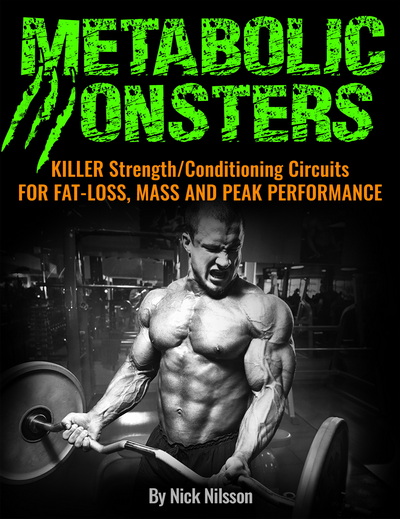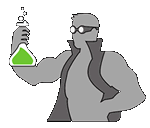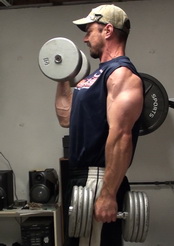I call this workout the All-Movement Driveway Circuit for two reasons...
First, it's "all movement" because you're literally targeting every major movement pattern during the course of the circuit (hip hinge, press, lunge, row, squat).
Second, I'm doing it out in my driveway because, at the time, my basement flooded during some severe storms, so I had to move my training out to the driveway until I got my gym cleaned up and put back together.
You don't have to do it in your driveway, of course!
I'll list the weights as I used as a reference, but definitely use what you think works best for your strength levels. All you need for this is a bit of free weight (in the form of dumbbells and/or kettlebells) and some floor space, making it a good choice for crowded gyms.
The exercises are put together in a very specific order, based on what they work and HOW they work.
Don't go to failure on ANY of these exercises. You can approach it, but don't hit it. Our idea here is to do a lot of overall WORK rather than push things to the point of exhaustion on each round.
Exercise #1 - Kettlebell (or Dumbbell) Swings
Pick a weight you can get at least 10 reps with. I'm using a 100 lb dumbbell with a KettleClamp attached to it as a handle (120 lbs total). Unfortuantely, that piece of equipment is no longer made (which is a shame, because it's awesome).
You can use a kettlebell or a dumbbell for these.
Swing until you start to feel your explosiveness fading. This exercise hits the posterior chain and is done explosively, so it goes first in the circuit.


Exercise #2 - Dumbbell Floor Presses
The press shifts the loading from the posterior chain to the pressing muscles of the upper body (chest, shoulders, triceps).
Lie down on the floor/ground and perform dumbbell presses. I'm using a pair of 70 lb dumbbells for this.
You want to use a weight you know you can get at least 10 or more reps with. We're not looking to go super-heavy or try to build strength here...just do a lot of work.


Exercise #3 - Two-Step Walking Lunges
This shifts the primary loading back to the lower body (though you will get some through the upper body while carrying the dumbbells...your grip will also get worked).
Go for distance on this one. I chose to go to the end of my driveway and back, which is about 40 feet total.
The Two-Step Walking Lunge is simple...instead of alternating legs with each step, take two steps with your left, then two steps with your right, then repeat. I find this pattern to be a bit easier on the knees. You can also go all the way in one direction on the same leg, then switch legs on the way back.
For weight, I'm using the same 70 lb dumbbells I did the presses with.




Then come all the way back to where your other weights are.

Exercise #4 - Braced One-Arm Dumbbell Rows
This exercise shifts the loading back to the pulling muscles of the upper body.
The next exercise is a one-arm dumbbell row done without a bench. You're going to brace for forearm of your non-working on your knee to form the base for the row.
Go fairly heavy. I'm using a 100 lb dumbbell for this...one of the same pair as I used for the swings.


Get as many reps as you can, then switch arms.


When performing the row, don't allow your lower back to round over. Look at the ground and a little bit forward to keep your neck in good alignment (there's not reason to look up and forward as this extends the neck too much).
Exercise #5 - Goblet Squats
Now we're back to primarily the lower body, however the Goblet Squats do put a LOT of loading on the upper body as well, due to the position of the weight in front of you.
At this point in the circuit, this exercise is BRUTAL. Supporting the dumbbell here impairs your breathing and your core will be pretty well shot.
Get as many reps as you can using the same dumbbell you did the rows with (100 lbs, in my case).
Start by coming down on one knee and setting the dumbbell on end on your thigh.

This is the easiest way to get heavy dumbbells in position for the Goblet Squat. Get your palms underneath the head of the dumbbell then stand up.

Then squat down.

Likely it won't be your legs that force you to end the set...it'll be core strength and how much you're gasping for air. Get as many reps as you can.
Workout Structure
That's ONE round.
I recommend doing this using a "front loading" rest structure to better manage fatigue and perform more overall work. Here's what that looks like:
-
After the first round, take 1 minute rest.
-
After the second round, take 2 minutes rest.
-
After the third round, take 3 minutes rest.
-
After the fourth round, take 4 minutes rest.
-
After the fifth round, take 5 minutes.
-
Then do your last round and you're done.
This gives you a total of six rounds...and believe me, that is PLENTY.
The reason I recommend this rest structure is that you'll be doing more work with less rest at the front of the workout. As fatigue kicks in, you're taking more rest in order to keep stretching out the workload. Your reps will drop a LOT on the later sets, especially if you're on a low-calorie diet at the time.
If you try to keep to a low rest period (like 1 or 2 minutes), you will gas out VERY quickly. This allows you to keep going.
It's brutal.
The Finisher
To finish it off, do a long distance loaded carry, which rounds it all out to complete the movement pattern set. This also is ideal for fat-burning.
This low-intensity aerobic work acts to burn off the free fatty acids that are currently circulating in your bloodstream (which were released from the fat cells by your high-intensity work). This low-intensity training prevents what's called "re-esterification" of the fat, which basically means, you burn it so it doesn't get put back into your fat cells.
I did a suitcase dumbbell carry with 50 lbs for 500 meters (you can choose to go more, if you like, but go for a continuous distance that takes you at least 5 minutes or more).

Go non-stop, switching hands as needed when your grip on one side starts to fade.

When doing this carry, try and keep the dumbbell off your hip. Keep your shoulders level so that your core is forced to stabilize the load and the dumbbell is not just leveraged on your leg.
Once you're done with THAT, then you're truly done.
---
Share This Page...



